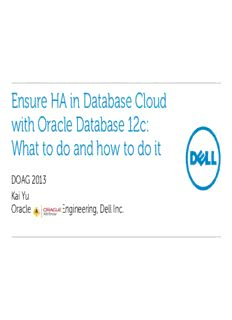
Oracle RAC one node database PDF
Preview Oracle RAC one node database
Ensure HA in Database Cloud with Oracle Database 12c: What to do and how to do it DOAG 2013 Kai Yu Oracle Solutions Engineering, Dell Inc. About Author • Kai Yu, Senior Principal Architect, Dell Database Engineering 18 years Oracle DBA/Apps DBAS and Solutions Engineering Specializing in Oracle RAC, Oracle VM and Oracle EBS Oracle ACE Director, Oracle papers author/presenter 2011 OAUG Innovator of Year, 2012 Oracle Excellence Award: Technologist of the Year: Cloud Architect by Oracle Magazine My Oracle Blog: http://kyuoracleblog.wordpress.com/ Co-author Apress Book “Expert Oracle RAC 12c” 2 Oracle OpenWorld 2013 What I do Providing solutions on the whole stack from the ground up http://www.delltechcenter.com/oracle • Solutions Deliverable List • Validated integration • Best practices • Virtualization • Oracle EM12c • Oracle Applications • Performance Study 3 Oracle OpenWorld 2013 Agenda • High Availability for Database Cloud • Database Cloud Architecture Design • Database Consolidation Models • High Availability Infrastructure Configuration • Achieving HA through Oracle RAC • Oracle RAC Troubleshooting and health Check 4 Oracle OpenWorld 2013 High Availability for Database Cloud • The Journey to Database Cloud – Challenges to the traditional computing architecture – Consolidate multiples databases : multitenant architecture – Integrate all the resources to allow provisioning on demand: dynamically provisioning to meet the workload needs – Provide Database as a Service (DBaaS)/ Platform as a Service (PaaS) – Provide Measuring and Charge back service 5 Oracle OpenWorld 2013 High Availability for Database Cloud Database High Availability Requirement – Defined by Service Level Agreement s(SLAs): – HA goal is to meet SLA requirement – Balance between the availability and implementation cost – SLA: for example, 99.95%, annual 4 hrs 22 minutes downtime Downtime window: first Saturday: 8pm-10pm every quarter High Availability Challenges in Cloud Environment – Consolidating many databases in a single cloud infrastructure – Great business impact due to the infrastructure downtime – Databases may have different SLAs for different business: • Different business requirements • Different time zones • Infrastructure downtime means downtime for all the databases • Very difficult to find the downtime for maintenance that meets every SLA 6 Oracle OpenWorld 2013 High Availability for Database Cloud Causes of Impacting System Availability – Service outage by unplanned downtime: hardware or software failure, human error, nature disaster, etc. – Service disruption by planned downtime: hardware/software upgrade, patching and migration from old system to new system – Service performance degradation: violate performance SLA for example, 99% transactions finished in a 2 seconds window Architect a High Availability Cloud Infrastructure – Design a highly available cloud architecture – Architect infrastructure to reduce unplanned outage – Implement methods/options to minimize planned downtime – Use configuration and implementation best practices for HA – Administration and troubleshooting tips for High Availability – Establish the pre-active real time monitoring system 7 Oracle OpenWorld 2013 Database Cloud Architecture Design Oracle Real Application Clusters: active-active cluster database • Based on share everything clustering architecture • Protect database availability against up to N-1 server failure • Reduce planned downtime for hardware, OS, software upgrade • Add node or remove node based on demand of capacity • Application load balancing • Provide high availability and scalability architecture UUsseerr ccoonnnneeccttiioonnss Node1 Node2 Node3 RAC RAC RAC Instance1 Instance2 Instance3 Cluster Interconnect RAC Database – 8 Oracle OpenWorld 2013 Database Cloud Architecture Design Basic Software Components: – Grid Infrastructure : Oracle Clusterware and ASM – Oracle RAC: Cache Fusion technology Hardware requirements: – Shared storage – Private Interconnect network for cluster heartbeat and RAC Cache 9 Oracle OpenWorld 2013 Database Cloud Architecture Design Oracle 12c Flex Clusters Architecture – Scalability limitation of the standard cluster • All nodes tightly-connected: N * (N-1)/2 interconnect paths • All nodes directly connected to storage: total N storage paths • Preventing the cluster to go beyond of 100 nodes. – Two two-layered hub-and–spoke topology: • Hub Node: interconnected and directly connected to the shared storage • Leaf Node: connected a Hub node, no storage connection • Scalability of Oracle 12cR1 RAC 64 Hub Nodes 20 up to 2000 Hub nodes + Leaf Nodes • Each Leaf node has its dedicated Hub node to connect Two two-layered 10 Oracle OpenWorld 2013
Description: